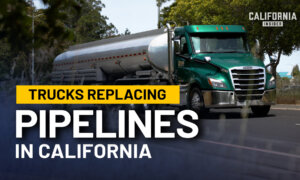California is delaying enforcement of its new regulations—originally taking effect Jan. 1—that would start phasing out diesel- and gas-powered trucks at ports and railyard, pending approval from the U.S. Environmental Protection Agency, according to a letter sent on Dec. 27, 2023, to the California Trucking Association and reviewed by The Epoch Times.
The federal agency is reviewing a request from the California Air Resource Board (CARB) to allow enforcement of the ban on such trucks from registering on the state’s list of vehicles approved for hauling cargo from ports and railyards.
“CARB does not plan to take enforcement action ... until the U.S. Environmental Protection Agency grants California a waiver for the regulation under the federal Clean Air Act or determines that no waiver is necessary,” Kate Lamb, information officer for the state’s air resource board, told The Epoch Times in a Dec. 29, 2023, email.
Adopted by the board in April 2023, the Advanced Clean Fleets regulations are designed to gradually replace diesel- and gas-powered trucks with zero-emission models in the next 20 years.
Such is needed to address pollution and air quality issues, according to Ms. Lamb.
“California has among the most polluted air in the nation, and the Advanced Clean Fleets rule offers a reasonable, phased-in path toward a zero emissions future that saves fleet operators on fuel and maintenance costs while bringing much-needed public health benefits to residents,” she said.
Trucks already registered will be exempt from the mandate for the life of the vehicle, but only zero-emission trucks can be added to the registry once the new rules are enforced, according to CARB’s website.
While waiting for authorization from the federal government, the state agency recommends that fleet owners and operators voluntarily comply with the new rules and transition to electric models.
Such will prevent any disruption in operations, Ms. Lamb said.
Regulators intend to revoke access for trucks added to the registry during the temporary reprieve period once the board receives approval from federal authorities, according to a letter sent by Steven Cliff, the board’s executive director.
‘Utterly Infeasible’ to Achieve: Trucking Association
Critics, including trucking companies, said the goals of the program are impossible to achieve because of infrastructure and technology limitations.
“We continue to oppose this rule for being utterly infeasible to achieve and for violating multiple State and Federal laws,” Eric Sauer, chief operating officer for the California Trucking Association, told The Epoch Times in a Dec. 29, 2023, email.
Industry experts say heavy-duty electric trucks aren’t available in sufficient numbers to satisfy demand and point to a lack of charging stations at ports.
The price of most electric semi-trucks—approximately $500,000 each—can be much higher than traditional trucks, based on listings for new models, and Tesla is seeking to gain market share by undercutting the price, with models ranging from $180,000 and up.
Facing what are described as insurmountable regulatory hurdles, the trucking association stated that legal challenges will continue.
“We will continue to advance arguments in future court proceedings and hope a more reasonable and achievable path to zero emissions can be reached,” Mr. Sauer said.
The association sued CARB in October—with litigation ongoing—seeking to stop regulators from enforcing the clean fleet rules.
Clean fleet regulations “represent a vast overreach that threatens the security and predictability of the nation’s goods movement industry,” according to the lawsuit.












